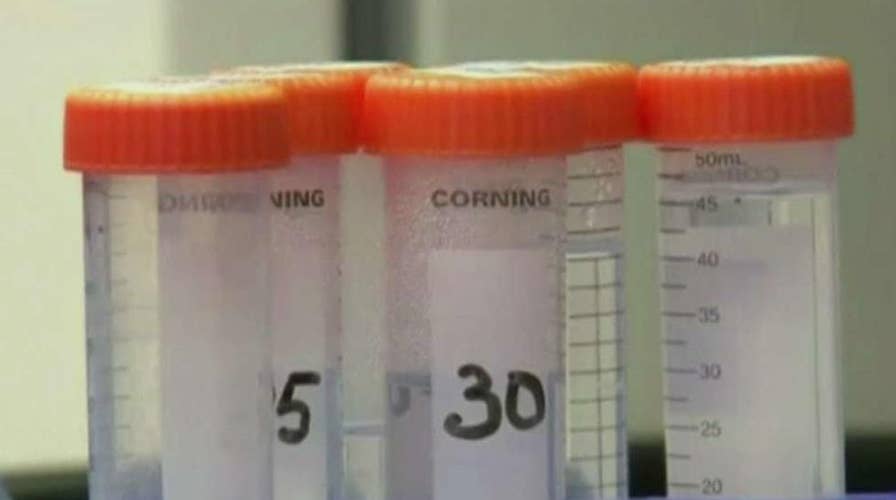Doctors may have cured second man of HIV
Doctors in London performed a bone marrow transplant on the patient and are calling the results 'long-term remission'; Steve Harrigan reports.
The message crackled like thunder.
"Great news today: My Administration just secured a historic donation of HIV prevention drugs from Gilead to help expand access to PrEP for the uninsured and those at risk," President Trump wrote on Twitter last week. He added the agreement would "help us achieve our goal of ending the HIV epidemic in America!”
Pre-exposure prophylaxis (PrEP) "reduces the risk of getting HIV from sex by more than 90% when used consistently," according to the Centers for Disease Control and Prevention. The multi-billion-dollar deal, brokered by Secretary of Health and Human Services Alex Azar, will provide PrEP for “200,000 individuals each year for up to 11 years."
GENERIC VERSION OF HIV PREVENTION DRUG ON WAY AFTER ACTIVIST CAMPAIGN
To term this a major milestone in the fight against HIV/AIDS — a disease that has taken the lives of hundreds of thousands of Americans and wrought an especially cruel toll on the LGBT community — is an understatement.
“Why is this not the #1 news on every major news outlet?” filmmaker Robby Starbuck opined, noting the sotto voce response from mainstream media.
United States Ambassador to Germany Ric Grenell called the agreement “historic” and “unprecedented,” and noted “a huge and growing divide between the self-appointed LGBT leaders in D.C. and regular LGBT Americans.”
Donald J. Trump is on track for a lasting legacy as the president who ended AIDS in America.
Indeed, not a single organization purporting to “advocate” for America’s LGBT community offered even a word of praise for this game-changing advance — a disgraceful reaction, especially considering data from the federal government showing "gay, bisexual, and other men who have sex with men bear the greatest burden by risk group [represent] an estimated 26,000 of new HIV infections per year."
For those not blinded by "Trump derangement syndrome" or those who are part of the agenda-driven press, the administration’s action is a natural and unsurprising development for a president who has made a point of prioritizing the battle against HIV and AIDS from the day he first set foot in the Oval Office.
President Trump’s first budget, released in March of 2017, committed to providing "sufficient resources to maintain current commitments and all current patient levels on HIV/AIDS treatment under the president’s Emergency Plans for AIDS Relief" (also known as PEPFAR).
And despite hefty cuts to federal programs across the board, domestic programs dedicated to assisting those with HIV/AIDS such as the Ryan White Care Act remained the "highest priorities" for the Trump administration.
In 2018, Trump rebooted the Presidential Advisory Council on HIV/AIDS (PACHA), replacing a board formerly comprised of Obama-era malcontents and grandstanders with a solid list of healthcare advocates and professionals of varying partisan persuasions.
The group, which reconvened in March, seems set to put policy over politics in their efforts to work in concert with the president, united by the shared goal of ending HIV. With that mission in mind, the president left his critics gobsmacked in February, announcing during his State of the Union address that he would ask "Democrats and Republicans to make the needed commitment to eliminate the HIV epidemic in the United States within 10 years."
"Scientific breakthroughs have brought a once-distant dream within reach," the president asserted. "Together, we will end AIDS in the United States and in the world."
It was a man-on-the-moon moment for a president whose tenure has been characterized by bold ambition, and the latest instance of Republican leadership combatting HIV.
During his tenure as speaker of the House in the mid-1990s, Newt Gingrich, R-Ga., worked tirelessly to speed Food and Drug Administration (FDA) approval of new medicines to treat HIV/AIDS patients. At the same time, now-retired Senator Tom Coburn, R-Okla., emerged as a preeminent and outspoken force in the campaign to end HIV. He proposed legislation, voted to reauthorize funding for federal programs assisting those with the disease, and directly engaged with HIV care advocates.
Our nation’s immediate past Republican President George W. Bush elevated the battle against HIV/AIDS, understanding the need to engage in the fight on global scale in order to vanquish the disease once and for all. It was Bush who created PEPFAR, which, according to the Kaiser Family, is "the largest commitment by any nation to address a single disease in the world; to date, its funding has totaled more than $80 billion."
By all accounts, President Trump is continuing in the tradition of compassionate GOP leaders who understand the suffering endured by those contending with HIV, realize the magnitude this pivotal moment medical science has achieved, and recognize that acting now will have historic consequences.
Such consequences have the potential to affect not only the medical community and those living with HIV, but Trump’s own presidency. “Such great news for so many,” Trump tweeted in March after learning news of the second patient in history to be cured of HIV. “Tremendous progress being made!”
After the deaths of millions of people worldwide from AIDS, frustrating rates of new HIV infections, and years without significant advances in treatment, it appears the United States is rounding a corner in our decades-long battle against the epidemic.
CLICK HERE TO GET THE FOX NEWS APP
Removing the dark cloud of HIV that for decades has loomed over Americans — and gay Americans in particular — will still take considerable work, a commitment to declared goals, and the leadership of a sharp chief executive.
With these principles as a guiding light, Donald J. Trump is on track for a lasting legacy as the president who ended AIDS in America.









































